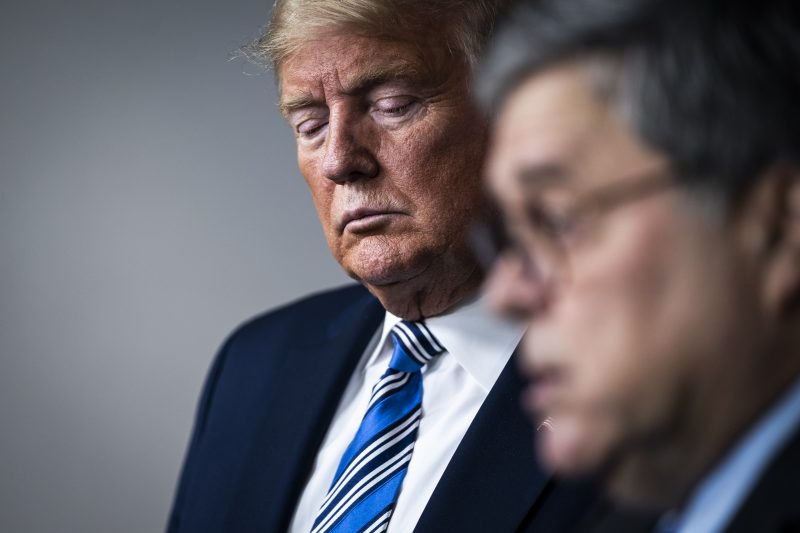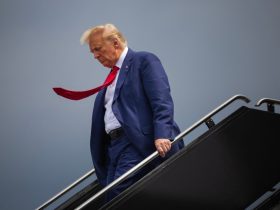William P. Barr’s effort to pre-spin the Mueller report on Russian interference in the 2016 presidential election might be the most controversial episode of his tenure as Donald Trump’s attorney general. But Barr also went pretty far in repeatedly previewing what special counsel John Durham would supposedly find in his investigation of those investigating Trump’s ties to Russia.
The results of the newly released Durham report, while undoubtedly reflecting poorly on the FBI, don’t live up to Barr’s hype.
Since the Durham probe began in 2019, Barr has offered some extraordinary comments seeming to prejudge its outcome. The thrust was unmistakable: that the Trump-Russia investigation appeared to be an overtly political effort to take down Trump — effectively, that it was the “witch hunt” Trump claimed it was.
There is little question this was the predicate for Durham’s investigation; after naming Durham to lead it, Barr said he wanted to know whether officials “abused their power and put their thumb on the scale.” Barr said that same week that he had taken the job as Trump’s attorney general in part because “I felt the rules were being changed to hurt Trump.”
Later in 2019, though, the Justice Department’s inspector general found no evidence of “intentional misconduct” or political bias tainting prosecutorial decisions; it did, however, find significant flaws in the investigation.
Barr downplayed the first of those findings.
He said that “the greatest danger to our free system is that the incumbent government used the apparatus of the state, principally the law enforcement agencies and the intelligence agencies, both to spy on political opponents, but also to use them in a way that could affect the outcome of the election.”
In early 2020, Barr went significantly further, calling the situation “one of the greatest travesties in American history” and again suggesting deliberate malfeasance. He cited “a whole pattern of events while [Trump] was president … to sabotage the presidency — or at least have the effect of sabotaging the presidency.”
“My own view is that the evidence shows that we are not dealing with just mistakes or sloppiness,” Barr said. “There is something far more troubling here, and we are going to get to the bottom of it. And if people broke the law and we can establish that with the evidence, they will be prosecuted.”
In fact, Durham’s investigation resulted in just one guilty plea, with a sentence of probation, for altering an email — a case that was effectively handed to Durham by the DOJ’s inspector general, Michael Horowitz. The other two prosecutions resulted in not-guilty verdicts.
And now Durham’s report provides little evidence to substantiate Barr’s underlying theory of the case.
Durham cites known instances in which key FBI figures including Peter Strzok and Kevin Clinesmith privately expressed a dim view of Trump and suggested solidarity with those who opposed him. Strzok, for instance, responded in August 2016 to the idea that Trump might be elected by saying, “No, he’s not. We’ll stop it.” When Trump was elected, Clinesmith told an FBI colleague, “Viva la resistance.”
Durham also points to how the Trump-Russia probe was handled differently from a matter involving Hillary Clinton that he saw as bearing similarities. Specifically, he notes that Clinton’s campaign was given what’s known as a “defensive briefing” on alleged efforts by a foreign actor to curry favor with her, but Trump’s campaign was not.
Durham doesn’t really dispute Horowitz’s finding about the lack of evidence of political taint or deliberate malfeasance.
He cites a “cavalier attitude toward accuracy and completeness” and “a serious lack of analytical rigor.” He dings the FBI for relying on information from Trump’s political opponents and says figures like Strzok and Clinesmith demonstrated “a predisposition to open an investigation into Trump.”
He goes little further than that.
Durham saves his most thorough examination of alleged bias for the final few pages of his 306-page report. Rather than focus on political bias, he keys in on “confirmation bias.”
Durham writes that “it seems highly likely that, at a minimum, confirmation bias played a significant role in the FBI’s acceptance of extraordinarily serious allegations derived from uncorroborated information that had not been subjected to the typical exacting analysis employed by the FBI and other members of the Intelligence Community.”
The distinction is important, which Durham seems to acknowledge. While discussing confirmation bias, he notes that it’s a “common human tendency” that is “mostly unintentional.”
That’s a far cry from Barr’s comments citing abuse of power and “sabotage,” and his claim that “we are not dealing with just mistakes or sloppiness.”
That the Durham probe failed to live up to Barr’s hype isn’t exactly news. The New York Times earlier this year published an extensive and worthwhile recap of just that. But when the prosecutions didn’t pan out, Barr shifted his focus away from criminal convictions.
In 2020, Barr said Durham’s “primary focus isn’t to prepare a report; he is to bring to justice people who were engaged in abuses if he can show that there were criminal violations.” But last year, Barr suddenly hailed the utility of getting “the story out.”
“I think he accomplished something far more important, which is he brought out the truth in two important areas,” Barr said.
As we wrote at the time: “We’ll have to wait to see whether Durham ever produces anything that could reasonably back up Barr’s hype. But Barr’s own comments suggest he himself isn’t terribly optimistic.”
Durham’s full story is now “out.” And much like the other special counsel’s report, it’s not what Barr suggested it would be.








